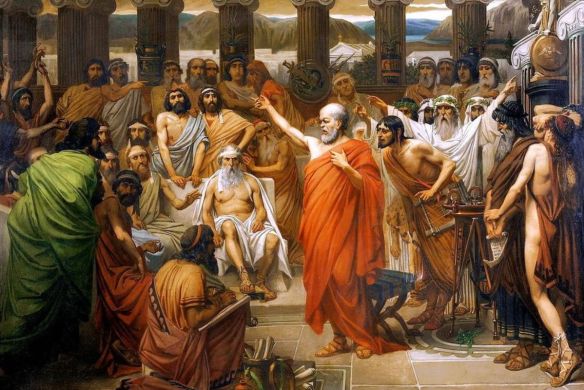
Aristotle (384-322 B.C.) along with Plato and Socrates are considered to be the greatest Greek philosophers, but he is most often compared to Plato. Even though he admired Plato, Aristotle critiqued Plato’s emphasis on the theory of the forms. Plato thought that the particular is less real and is derived from universal things, whereas Aristotle believed the universal things were less real and were derived from the particular. Aristotle’s teachings stated that the material world should not be despised or ignored (like Plato thought) but studied. This resulted in Aristotle doing much more scientific research than his predecessors.
Since he was the son of a physician, Aristotle had prior medical knowledge, and he and his students would gather information about plants and animals, as well as the history of the Greek constitution and science. Aristotle even attempted to categorize animals into their own species based on their reproduction and hibernation habits, but there were numerous errors. Still, many concepts and much of the language of Western philosophy derives from him.
Similar to Plato, Aristotle also debated how to have a good life, concluding that happiness is the best thing to have if you want to achieve this goal, which can be obtained by leading a virtuous life, doing good works, and developing a skill that matches your talent.
Years after the time of Aristotle, Sparta conquered the neighboring district of Messenia. The Spartan citizens were given a large amount of the Messenian land and the Messenians were reduced to slavery. Because the slaves outnumbered the Spartans ten to one, the Messenians slaves revolted following their capture, which required a large military presence from the Spartans. Two kings and a board of elders controlled the Spartan Government, and only men over 30 could vote.

At age seven, every Spartan boy left home to endure 13 years of military training. They were given just enough food to keep them alive and no coat in the harsh winter of the Greek mountains. All this was done to ensure that Sparta had the best fighting men of any army. Despite their impressive fighting force, Sparta lacked a strong navy and always feared a Messenian revolt when the armies were off at war. Eventually, they were defeated along with the other Greek city-states during the Peloponnesian War in 440 BC, and would never rise to their old prowess.



